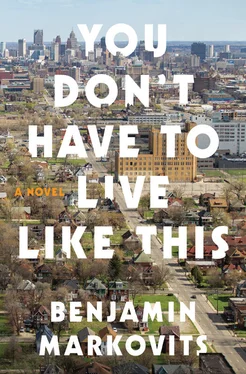Gloria and I called each other practically every night. I sat in my old bedroom like a teenager, with the door closed, talking quietly, except when I was a teenager I didn’t have a girlfriend. One night I even went through my bedroom closet, looking for shoe boxes — the ones I had stashed my lead soldiers into a couple of weeks before going to Yale. They were still there. I unwrapped a few of the figures from their squares of kitchen towel, feeling a sort of abstract sadness. It struck me that all of my childhood interests and enthusiasms could be explained as displaced sexual energy.
On Christmas morning, while my mother got the dinner ready, my dad and I drove down to the racquet club and played squash. I could beat him easily these days. His hair, which was yellow, had become yellow-white. At least he hadn’t gotten fat, he was never particularly skinny, but he had these skinny legs. And since his feet didn’t bounce off the ground anymore, his running looked like a kind of sprightly walking. Especially since he held himself uncomfortably upright, even chasing balls. There’s a history of back trouble in my family. I felt sorry for him, beating him, but he didn’t seem to mind.
Afterwards, in the showers, he said, “Are you having an okay time up there?” His chest was broad and muscular. It had faint white hairs, almost the color of his skin, running between his breasts and down to his navel. He was still physically vain and soaped himself off with pleasure, but his hair looked thin under the water. “Are you living the way you want to live?”
“Getting there.”
“Because I know that was always very important to you.”
“Whatever that means,” I said.
The club was pretty empty on Christmas morning, there were only a couple of old guys in the showers, but my dad knew one of them, so we had to put off our stupid argument until the drive home. Then he started asking questions about the setup in Detroit — what had happened to the people who used to live in these neighborhoods. Really he wanted to impose on me his Greater Knowledge of the World.
“You don’t need to talk to me about these people. I’ve thought about them more than you have, believe me.”
“Give me a break,” he said. “I used to be a union rep.”
“You represented a bunch of journalists. The oppressed middle classes.”
“What are you talking about, I started out on the docks, with the ILA. Don’t talk to me about racial tensions. I only got out when you kids were born, when we moved to Baton Rouge. So it shouldn’t surprise me I have suburban middle-class kids. But this isn’t what I wanted to talk about. One of my boys wants to make money, and gets it; and the other one wants something else. I just wanted to know if you were getting it.”
“I don’t know what you mean by something else . You make it sound like a kind of luxury.”
“Well, for most people it is. If we’re talking about some philosophical idea of happiness here. People in my experience live much more for pleasure, they’re forced to.”
“That’s a terrible thing to say. That’s not even true. I don’t even think you know what you mean by the distinction.”
“That’s three different arguments,” he said. “Pick one.”
But we all tried our best when we sat down to eat. Christmas is a lonely meal for three people. The food outnumbers the company. There was turkey and two types of stuffing, cranberry sauce and greens, a salad and mash potatoes, and gravy, and a bottle of wine, which only my father drank much of. I never felt comfortable drinking in front of my mother.
“Why didn’t you want to go to Houston?” I asked them.
“Your mother doesn’t like Andrea’s cooking.”
“She’s a fine cook.”
But my mother said, “It isn’t her cooking. She has no sense of ceremony. The children should get a sense of what Christmas means.”
“You mean, they should get a sense of the effort you put into it. They should feel guilty.”
“Putting a little effort into something is nothing to be ashamed about. The fact is that Andrea is not a great coper, which I don’t understand at all, because she has much more help in the home than I ever had.”
Afterwards my mother and I cleared up and my dad went out to smoke a cigarette. “Did you have a fight about something?” she said, over the dishes. “What about?”
“I don’t really know.”
“Who won?”
“You mean the squash? I did.”
“You know that’s not what I mean.”
The next day my brother drove down from Houston by himself, about a five-hour drive. We had a late lunch together and afterwards Brad and I went out to throw a football in the street. It was about sixty degrees out, there was no wind, and even through the endless white cloudy sky you could feel the heat of the sun.
Brad was a couple of inches taller than me, bigger in the chest and better looking, with fair hair and a blond face. But he’d also grown a gut, sitting on his ass and billing time. Mostly he threw and I chased the balls down, running routes down the middle of the road.
At one point he said to me, “So you getting any action in Detroit?”
“I think I got a girlfriend,” I said. “A real Detroiter.”
“What does that mean?”
“Someone who grew up there, not someone like me. She’s black.”
“I meant, what do you mean, think ?”
“It’s early days.”
You couldn’t talk like this throwing a ball back and forth, but sometimes a car came by, and then we stood around together by the side of the road and carried on a conversation. We wanted to talk and sometimes flipped the ball between us for an excuse.
After a while, he said, “I think Dad’s got a girlfriend.”
“What makes you say that?”
“He keeps calling me up. He wants to talk. He wants to make me like him before he tells me.”
“I don’t understand.”
“This is why Mom’s stressed out.”
“I don’t understand, did Mom say something to you?”
“She’s been saying stuff like this to me for the past twenty years, but this time she says it’s true.”
“And you believe her this time?”
“I believed her some of the times before.”
“How come Mom doesn’t tell me any of this stuff?”
“Come on, Greg. You’re her little boy. She loves you more.”
He drove home before supper, around six o’clock. My mother tried to put something on the table for him, but Brad said he planned to eat on the road — it would keep him awake. So this was the last real conversation I had about anything until I got back to Detroit. But that was partly my fault. I don’t know why I didn’t tell them about Gloria.
A FEW DAYS INTO THE New Year, my dad moved out and I started spending a lot of time on the phone with my mother. She didn’t know for sure if he was seeing somebody. At first all he did was rent a room from some friends of his in New Orleans, the same place I moved into briefly after quitting my job at Aberystwyth. My mom had bad things to say about these people, whom she once considered friends of hers, too, but I also felt implicated in the business. As if I’d been giving him ideas.
“Look,” I said. “It’s not like I was particularly happy there. I mean, I didn’t last long.”
“I’m sure he’s having a ball.”
“Are you talking to each other?” I said.
“He tries to call me about every other day, but I don’t want to talk to him so I hang up the phone.”
“What did he say to you when he moved out?”
“He said he wasn’t very happy. He said he’d been trying to talk to me about this for some time, which is true, but that I didn’t want to hear it. That’s true, too. I never could see the point of analyzing what you can’t change, which is that we were more or less stuck with each other. But apparently he didn’t see it that way.”
Читать дальше












